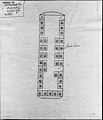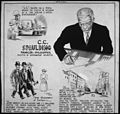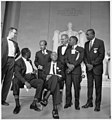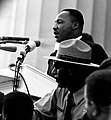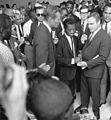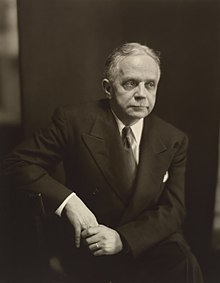Portal:Civil rights movement
The civil rights movement portal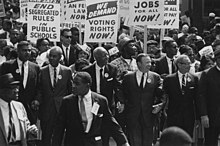 The civil rights movement was a social movement in the United States from 1954 to 1968 which aimed to abolish legalized racial segregation, discrimination, and disenfranchisement in the country, which most commonly affected African Americans. The movement had origins in the Reconstruction era in the late 19th century, and modern roots in the 1940s. After years of nonviolent protests and civil disobedience campaigns, the civil rights movement achieved many of its legislative goals in the 1960s, during which it secured new protections in federal law for the civil rights of all Americans. Following the American Civil War (1861–1865), the three Reconstruction Amendments to the U.S. Constitution abolished slavery and granted citizenship to all African Americans, the majority of whom had recently been enslaved in the southern states. During Reconstruction, African-American men in the South voted and held political office, but after 1877 they were increasingly deprived of civil rights under racist Jim Crow laws (which for example banned interracial marriage, introduced literacy tests for voters, and segregated schools) and were subjected to violence from white supremacists during the nadir of American race relations. African Americans who moved to the North in order to improve their prospects in the Great Migration also faced barriers in employment and housing. Legal racial discrimination was upheld by the Supreme Court in its 1896 decision in Plessy v. Ferguson, which established the doctrine of "separate but equal". The movement for civil rights, led by figures such as W. E. B. Du Bois and Booker T. Washington, achieved few gains until after World War II. In 1948, President Harry S. Truman issued an executive order abolishing discrimination in the armed forces. In 1954, the Supreme Court struck down state laws establishing racial segregation in public schools in Brown v. Board of Education. A mass movement for civil rights, led by Martin Luther King Jr. and others, began a campaign of nonviolent protests and civil disobedience including the Montgomery bus boycott in 1955–1956, "sit-ins" in Greensboro and Nashville in 1960, the Birmingham campaign in 1963, and a march from Selma to Montgomery in 1965. Press coverage of events such as the lynching of Emmett Till in 1955 and the use of fire hoses and dogs against protesters in Birmingham increased public support for the civil rights movement. In 1963, about 250,000 people participated in the March on Washington, after which President John F. Kennedy asked Congress to pass civil rights legislation. Kennedy's successor, Lyndon B. Johnson, overcame the opposition of southern politicians to pass three major laws: the Civil Rights Act of 1964, which prohibited discrimination based on race, color, religion, sex, or national origin in public accommodations, employment, and federally assisted programs; the Voting Rights Act of 1965, which outlawed discriminatory voting laws and authorized federal oversight of election law in areas with a history of voter suppression; and the Fair Housing Act of 1968, which banned housing discrimination. The Supreme Court made further pro–civil rights rulings in cases including Browder v. Gayle (1956) and Loving v. Virginia (1967), banning segregation in public transport and striking down laws against interracial marriage. (Full article...) Selected article -"A Change Is Gonna Come" is a song by American singer-songwriter Sam Cooke. It initially appeared on Cooke's album Ain't That Good News, released mid-February 1964 by RCA Victor; a slightly edited version of the recording was released as a single on December 22, 1964. Produced by Hugo & Luigi and arranged and conducted by René Hall, the song was the B-side to "Shake". The song was inspired by various events in Cooke's life, most prominently when he and his entourage were turned away from a whites-only motel in Louisiana. Cooke felt compelled to write a song that spoke to his struggle and of those around him, and that pertained to the Civil Rights Movement and African Americans. Though only a modest hit for Cooke in comparison with his previous singles, "A Change Is Gonna Come" is widely considered one of Cooke's greatest and most influential compositions and has been voted among the greatest songs ever recorded by various publications. In 2007, the song was selected for preservation in the Library of Congress by the National Recording Registry, having been deemed "culturally, historically, or aesthetically significant." In 2021, Rolling Stone magazine placed it at number 3 on its list of the "500 Greatest Songs of All Time", and in 2025, the magazine placed it at number 1 on its list of "The 100 Best Protest Songs of All Time." (Full article...) General imagesThe following are images from various civil rights movement-related articles on Wikipedia.
Related portalsWikiProjectsSelected biography -Walter Francis White (July 1, 1893 – March 21, 1955) was an American civil rights activist who led the National Association for the Advancement of Colored People (NAACP) for a quarter of a century, from 1929 until 1955. He directed a broad program of legal challenges to racial segregation and disfranchisement. He was also a journalist, novelist, and essayist. White first joined the NAACP as an investigator in 1918, at the invitation of James Weldon Johnson. He acted as Johnson's assistant national secretary and traveled to the South to investigate lynchings and race riots. Being light-skinned, at times he was able to pass as white to facilitate his investigations and protect himself in tense situations. White succeeded Johnson as the head of the NAACP in an acting capacity in 1929, taking over officially in 1931, and led the organization until his death in 1955. He joined the Advisory Council for the Government of the Virgin Islands in 1934, but he resigned in 1935 to protest President Franklin D. Roosevelt's silence at Southern Democrats' blocking of anti-lynching legislation to avoid retaliatory obstruction of his New Deal policies. (Full article...) Selected image -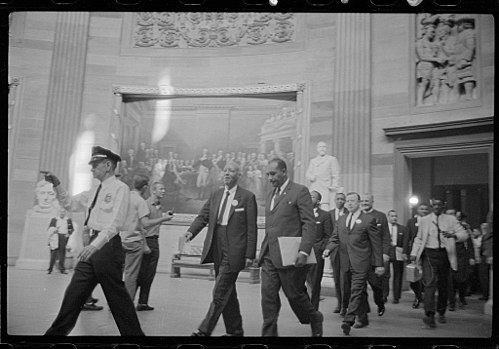 A. Philip Randolph and other civil rights leaders on their way to Congress during the March on Washington, 1963.
Did you know?
TopicsSubcategoriesThings to doAssociated WikimediaThe following Wikimedia Foundation sister projects provide more on this subject:
Discover Wikipedia using portals
|


